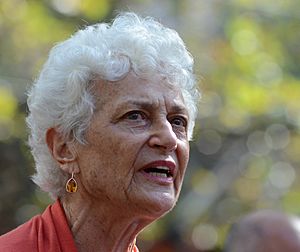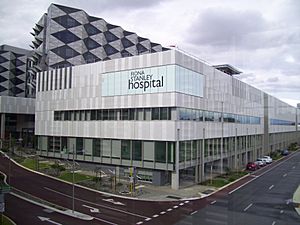Fiona Stanley facts for kids
Quick facts for kids
Fiona Stanley
AC FAA FASSA
|
|
|---|---|

Stanley at the March for Science in Melbourne 2017
|
|
| Born |
Fiona Juliet Stanley
Little Bay, New South Wales, Australia
|
| Nationality | Australian |
| Education | St Hilda's Anglican School for Girls |
| Alma mater | University of Western Australia University of London London School of Hygiene & Tropical Medicine |
| Known for | Confirmed the benefit of folate in preventing spina bifida |
| Spouse(s) | Geoffrey Shellam |
| Awards | Companion of the Order of Australia (1996) Fellow of the Australian Academy of Science (2002) Centenary Medal (2001) Australian of the Year (2003) Australian Living Treasure (2004) |
| Scientific career | |
| Fields | Epidemiology |
| Institutions | Telethon Kids Institute (1990–2011); University of Western Australia |
Fiona Juliet Stanley is a famous Australian scientist. She is an epidemiologist, which means she studies how diseases spread. She is well-known for her work in public health and her research on the health of children and mothers. She also studied birth problems like cerebral palsy.
Fiona Stanley is the patron of the Telethon Kids Institute. She is also a special professor at the University of Western Australia. From 1990 to December 2011, she was the first director of the Telethon Kids Institute.
Early Life and Education
Fiona Juliet Stanley was born in Little Bay, New South Wales, Australia. As a child, she loved reading about important people like Marie Curie. Her father was a researcher who studied polio. Through him, she met Jonas Salk, who developed the polio vaccine.
Fiona dreamed of traveling to faraway islands. She wanted to help people by giving them vaccines to stop diseases.
In 1956, her family moved to Western Australia. Her father became a professor at the University of Western Australia. Fiona went to St Hilda's Anglican School for Girls. Later, she studied medicine at the University of Western Australia and finished her degree in 1970.
Career Highlights
Helping Aboriginal Children
In the early 1970s, Fiona Stanley started working at a children's hospital in Perth. She saw many sick Aboriginal children who were flown in from remote areas. She realized that even after doctors helped them, these children returned to difficult living conditions. These conditions often caused their health problems.
This experience made her want to understand why children were getting sick. She traveled with colleagues to many Aboriginal communities in Western Australia. They talked to elders to learn about health and environmental issues. This helped her understand how living conditions affect children's health. She also worked at an Aboriginal clinic in East Perth.
Focus on Prevention and Public Health
Her experiences led her to become interested in epidemiology and public health. Instead of just treating diseases, she wanted to prevent them. She spent six years in the United Kingdom and the United States. There, she researched these important areas.
When she returned to Perth, she started new research programs. These programs focused on preventing health problems. She became part of a new way of thinking in medicine. This new way focused on stopping diseases before they started. It also looked at how social factors cause health issues.
Using Data to Improve Health
Throughout her career, Fiona Stanley has shown how important it is to use information about large groups of people. This data helps improve health, social well-being, and the economy. In 1977, her research team created the WA Maternal and Child Health Research Database.
This database collects unique information about births from all over Western Australia. It has been very useful for predicting health trends for mothers and children. It also helps show how well prevention programs are working.
Research on Birth Defects
Fiona Stanley's research also looked at ways to improve health for everyone. She studied the causes and prevention of birth defects. This included major brain and nerve disorders like cerebral palsy. She also researched why some babies are born with low birth weight. Her work explored how this affects them throughout their lives.
Her team also studied health patterns in Aboriginal and Caucasian populations. The data they collected helped them find a link between a lack of folic acid in diets and spina bifida. Spina bifida is a birth defect that affects the spine. Her work in 1989 helped confirm that taking folate could greatly reduce the risk of spina bifida.
Founding the Telethon Kids Institute
In 1990, Fiona Stanley became the first director of the Telethon Kids Institute. This institute is in Nedlands, Western Australia. It is a research center where many different experts work together. They investigate what causes major childhood diseases and disabilities. They also look for ways to prevent them.
Since 1995, the institute has received a lot of money from an annual telethon. It also gets funding from the government and other research groups.
Australian Research Alliance for Children and Youth (ARACY)
In 2002, Fiona Stanley worked hard to get the Australian Research Alliance for Children and Youth (ARACY) started. The prime minister of Australia at the time, John Howard, launched it. Fiona Stanley became its chairperson.
ARACY has offices in Canberra, Perth, and Melbourne. Its goal is to encourage teamwork and use evidence to improve the well-being of young Australians. In 2003, she gave a speech where she talked about "modernity's paradox." This means that even with more wealth, there are still more problems for children and young people. These problems include asthma, obesity, diabetes, and mental health issues. She argued that experts from different fields need to work together. She said the challenge is to help children earlier in their lives to prevent these problems.
Other Roles and Recognition
Fiona Stanley is a professor at the University of Western Australia. She is also the UNICEF Australian ambassador for Early Childhood Development. In 2003, she was named Australian of the Year. In 2011, she joined the board of the Australian Broadcasting Corporation. A hospital, the Fiona Stanley Hospital, was named in her honor. It officially opened on October 3, 2014.
Awards and Honours
Fiona Stanley has received many awards and honours for her important work:
- 1996: She was made a Companion of the Order of Australia (AC). This was for her service to research on the health of mothers and children. It also recognized her work in improving Aboriginal and community health.
- 1996: She was chosen as a fellow of the Academy of the Social Sciences in Australia.
- 2001: She received the Centenary Medal.
- 2002: She became a fellow of the Australian Academy of Science. She was also featured on an Australian stamp as one of six important Australian medical scientists.
- 2003: She was named Australian of the Year.
- 2004: The National Trust named her an Australian Living Treasure.
- 2008: She was a runner in the 2008 Summer Olympics torch relay in Canberra.
Honorary Degrees
Fiona Stanley has also received many honorary degrees from universities. These are special degrees given to people who have made great contributions.
- 1998: Honorary Doctor of Science (Hon DSc) from Murdoch University
- 2001: Honorary Doctor of the University (Hon DUniv) from Queensland University of Technology
- 2004: Honorary Fellow of the Royal Australian College of General Practitioners (Hon FRACGP)
- 2005: Honorary Doctor of Medicine (Hon MD) from University of Sydney
- 2006: Honorary Fellow of the Royal College of Paediatrics and Child Health (UK) (Hon FRCPCH)
- 2008: Honorary Doctor (Hon MD) from University of Melbourne
- 2009: Honorary Bragg Member, Royal Institution of Australia
- 2010: Honorary Doctor of Science (Hon DSc) from Edith Cowan University
- 2014: Honorary Doctor from KU Leuven for her work on poverty research.
- 2015: Honorary Fellow of the Australian Academy of Health and Medical Sciences.
- 2019: International Honorary Member - American Academy of Arts and Sciences.
Personal Life
Fiona Stanley is married to Geoffrey Shellam. He later became a professor of microbiology, holding the same position her father once had.
In October 2023, Fiona Stanley was one of 25 Australians of the Year. They signed an open letter to support the Yes vote in the Indigenous Voice referendum.
 | Selma Burke |
 | Pauline Powell Burns |
 | Frederick J. Brown |
 | Robert Blackburn |


